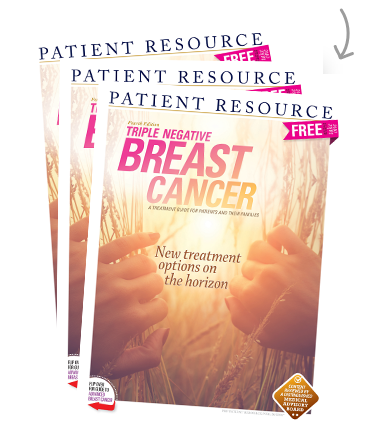Triple Negative Breast Cancer
Searching for a Clinical Trial
As you and your doctor work together on your treatment plan, it’s important to talk about all the available options. Your doctor may discuss clinical trials as a potential option, so it’s important for you to understand what that may mean.
Clinical trials investigate whether a new type of treatment, such as a drug, surgery or radiation therapy or a combination of them, is better than the current standard of care. You may not be aware that all of the cancer treatments approved today are the result of these research studies. Clinical trials offer several possible benefits:
- Access to leading-edge therapies that aren’t yet widely available.
- An alternative strategy if your cancer becomes resistant to your current treatment.
- A higher level of care because you will be closely monitored by your regular oncologist and the clinical trial medical team. This extra attention may help identify and then treat side effects or other problems early.
- The role of being an active partner in your care.
As your own best advocate, it’s important to know that it is always your decision to participate in a clinical trial, even if you’ve already started it.
If the trial doesn’t meet your expectations at any time or for any reason, you may leave it and return to standard-of-care treatment.
Now that you have the basic information, where do you go from here? Asking your doctor if you should consider a clinical trial is a great start. You can also search for a trial online. Enlist the help of family members and friends to help you search, and go to your doctor with suggestions.
Because finding trials that may work for you can be complicated, below is a mock search site to help you navigate the process. Before you begin, have your exact diagnosis, pathology report and details of previous treatments handy because eligibility requirements will differ for each trial.
Searching for a Clinical Trial
Be an active participant in your own care by looking online at available trials. These step-by-step instructions will help guide you. Once you feel comfortable with the search process, use the list of clinical trial resources below to look for a trial that may apply to you.
[STEP 1] FILL IN YOUR INFORMATION
Your Diagnosis
Enter "triple negative breast cancer". To create more options, you can also search for "TNBC" and compare results.
Desired Location
If you prefer a clinical trial close to home, use your address. Enter additional locations if you're willing and able to travel for treatment.
Other Terms
You can refine your search by adding a treatment type such as immunotherapy, a specific drug or a National Clinical Trial (NCT) identifier. During your research, you may notice that an NCT identifier is assigned to each clinical trial. Identifiers begin with the letters "NCT" followed by eight numbers.
[STEP 2] READ YOUR SEARCH RESULTS
Recruitment Status
This indicates whether the trial is actively seeking patients, not yet recruiting or otherwise inactive. The status will change, so check for updates.
Summary of Study
Here you'll find details about the purpose of the clinical trial and the treatment being studied. This section is usually written for health care providers, so it may be difficult to understand. In that case, print out the information to discuss with your doctor.
Eligibility Criteria
This outlines the requirements you must meet to be eligible for the trial, such as the stage of disease, sites of metastasis, overall health requirements and previous treatments.
Contacts and Locations
This may contain contact information for the clinical trial investigators, staff or sponsors who may be able to provide more details about the study. Trial locations may be included.
Sponsor
This is the organization responsible for the clinical trial. It may be a pharmaceutical or a biotechnology company, a university or the National Cancer Institute.



